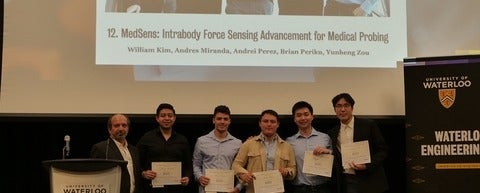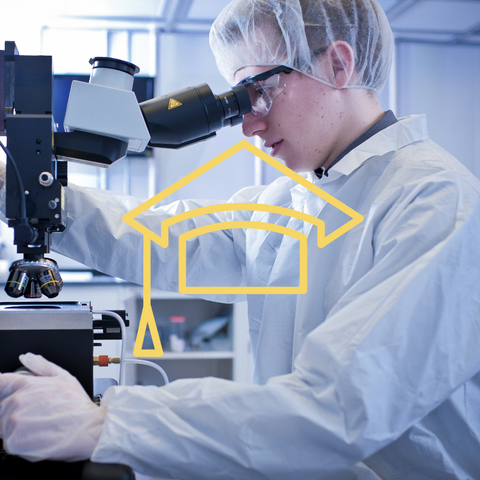Nanotechnology Engineering involves materials science and engineering, chemistry, physics, biology, and medicine. Nanotechnology discoveries and innovations have advanced biomonitoring devices, medical diagnostic and drug delivery therapies, functional materials, sensors, computers, communications, and sustainable energy materials. Nanotechnology impacts many industries, ranging from medical to pharmaceuticals, electronics to automotive, and communications.
Fun Facts about our Nanotechnology Engineering Program.
- The Nanotechnology Engineering Program was launched in 2005
- This program at the University of Waterloo is the first accredited Nanotechnology Engineering Program in Canada
- There are more than 500 students currently enrolled in our program
- We have a dedicated clean room with multimillion-dollar cutting-edge equipment for hand-on experiential learning
Waterloo offers hands-on laboratories with state-of-the-art equipment to train students to undertake material strength testing, chemical synthesis and investigation, biological sensing, nanoscale object analysis, and work in cleanroom environments.
Nanotechnology Engineering is one of the most interdisciplinary engineering programs and graduates of this program go on to found companies, work in established industries, or continue to graduate studies in Engineering or Science. Nanotechnology offers many paths to a successful future!
Waterloo's Nanotechnology Engineering program is run collaboratively through the Department of Chemical Engineering and the Department of Electrical and Computer Engineering in the Faculty of Engineering, and the Chemistry Department in the Faculty of Science.
The top five career sectors that our graduates are employed in are:
- semiconductors and electronics
- software
- healthcare and pharmaceuticals
- manufacturing
- entrepreneurship (start-ups)
Nanotechnology Engineering at UWaterloo
What is NE? Check Out this Animated Video
Learn About our Facilities Watch our Lab Tour Video
What is Nanotechnology Engineering Webinar
Nanotechnolgy Engineering and the COVID mRNA Vaccine
Nanotechnology Engineers design integrated circuits
News
Class of 2024 alumni named as a leading innovator by The Logic
Nanotechnology Engineering (NE) alumni Helen Engelhardt (BASc ’24) has been named as a “Top Prospect” by The Logic.
During her studies in Nanotechnology Engineering, Engelhardt worked on reducing emissions, energy storage, scaling cutting-edge technology, and promoting recycling for a circular economy. Her impactful research has been published in multiple scientific journals, and she has also made proprietary technological advancements in mRNA vaccine manufacturing and battery recycling.
Engelhardt enjoyed a variety of co-op positions during her undergraduate degree which included SiTration a recycling start-up based at MIT and the National Research Council of Canada, Nanotechnology Research Centre as a research and development intern.
Capstone team wins first place for innovative surgical technology
Team 12 was a big winner at this year's Capstone Symposium. Their Team took first place for the Nanotechnology Engineering Fourth-Year Poster and Prototype, and received the Norman Esch Engineering Entrepreneurship Award. Their project was titled “MedSens: Intrabody Force Sensing Advancement for Medical Probing”.
Team members William Kim, Andres Miranda, Andrei Perez, Brian Periku and Yunheng Zou were supervised by Dr. Peng Peng at the Centre of Advanced Materials Joining. The team has developed cutting-edge technology designed to enhance the safety and precision of endoscopic procedures.
Team 12’s project addresses a critical issue for surgeons performing procedures, particularly endoscopies where success hinges on the surgeon's skill. During these procedures, it is often hard for surgeons to tell how much force they are exerting on the patient’s body.
Capstone Team wins Esch Competition and advances personalized medicine for depression treatment
Nanotechnology Engineering Team 18 won this year’s Esch Competition with their project GeneDetek. Team members Karla Castro, Andrea Parra, Sara Thompson, and Nube Torres developed an electrochemical biosensor for genetic mutation detection.
Depression is a complex mental health condition that affects millions worldwide. For many patients, finding an effective treatment can be a daunting challenge, often complicated by adverse side effects of prescription drugs.













